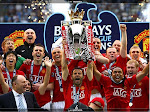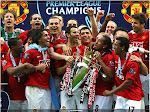 The Liverpool - Manchester United fixture is one of the most significant sporting rivalries in the world. Both clubs hail from the North West of England, they are also the two most successful teams in England, between them they have won 72 major trophies. The fixture is usually played at midday, due to both media interest and to discourage fans from drinking before the game. Long-term Manchester United player Ryan Giggs says that Liverpoool against Manchester United is "the most famous fixture in English football".
The Liverpool - Manchester United fixture is one of the most significant sporting rivalries in the world. Both clubs hail from the North West of England, they are also the two most successful teams in England, between them they have won 72 major trophies. The fixture is usually played at midday, due to both media interest and to discourage fans from drinking before the game. Long-term Manchester United player Ryan Giggs says that Liverpoool against Manchester United is "the most famous fixture in English football".The Liverpool-Manchester football rivalry started in the late 1950's but was originally between Everton and Manchester United, with the clubs two of the most successful and best supported in the country. However with Everton's decline in the 1970's and the dominance of Liverpool, Manchester United attention changed to the red half of Merseyside.
Both clubs claim the title of 'the Greatest English Football Club', with Liverpool winning a total of 40 major trophies, while Manchester United have 32. Liverpool dominated English football during the 1970s and 1980s, winning the European Cup four times during that period. Manchester United have been the most successful English team of the 1990s and early 2000s, winning a treble (of the European Cup, the Premiership and the FA Cup) in 1999.
a total of 40 major trophies, while Manchester United have 32. Liverpool dominated English football during the 1970s and 1980s, winning the European Cup four times during that period. Manchester United have been the most successful English team of the 1990s and early 2000s, winning a treble (of the European Cup, the Premiership and the FA Cup) in 1999.
As well as competing on the football pitch, both teams are also two of the biggest-earning clubs in the world, based on revenue. The two also have among the largest fanbases in England and internationally. Manchester United are widely regarded as the most popular sports club in the world.
The rivalry between the two clubs has become so intense that since the 1964 transfer of Phil Chisnall from United to Liverpool, no player has been transferred since. Some players however have played for both clubs, but having played elsewhere between each tenure, such as Paul Ince. In 2007 there was an attempted transfer of Gabriel Heinze from United to Liverpool, but United refused to allow him to join their biggest rivals because it was agreed he would only join a foreign club. Heinze eventually joined Real Madrid instead.









 more lies..... No more lies..... No more lies..... No more lies...MY HEART...MY SOUL..MY LOVE..FOREVER MANUTD...MANCHESTER UNITED..A matter of life and death....THE RED DEVILS
more lies..... No more lies..... No more lies..... No more lies...MY HEART...MY SOUL..MY LOVE..FOREVER MANUTD...MANCHESTER UNITED..A matter of life and death....THE RED DEVILS